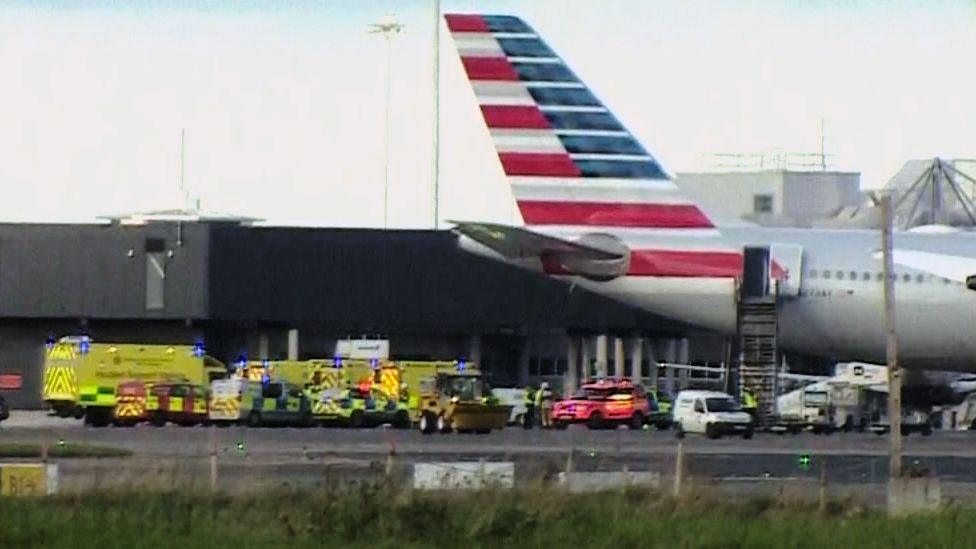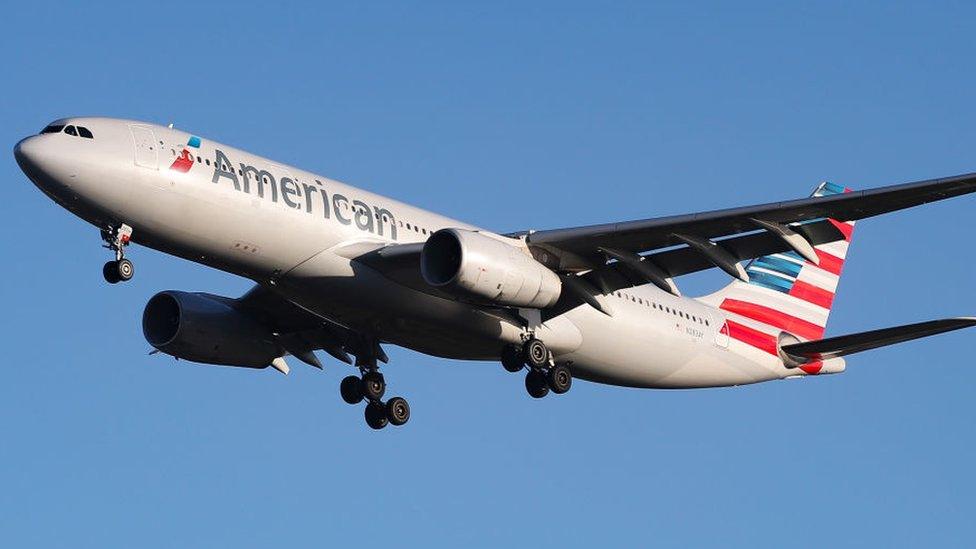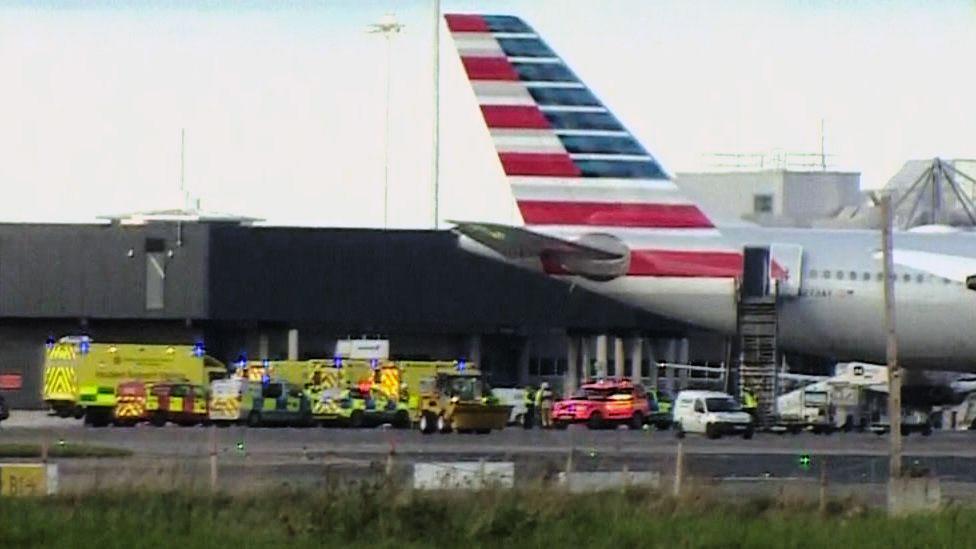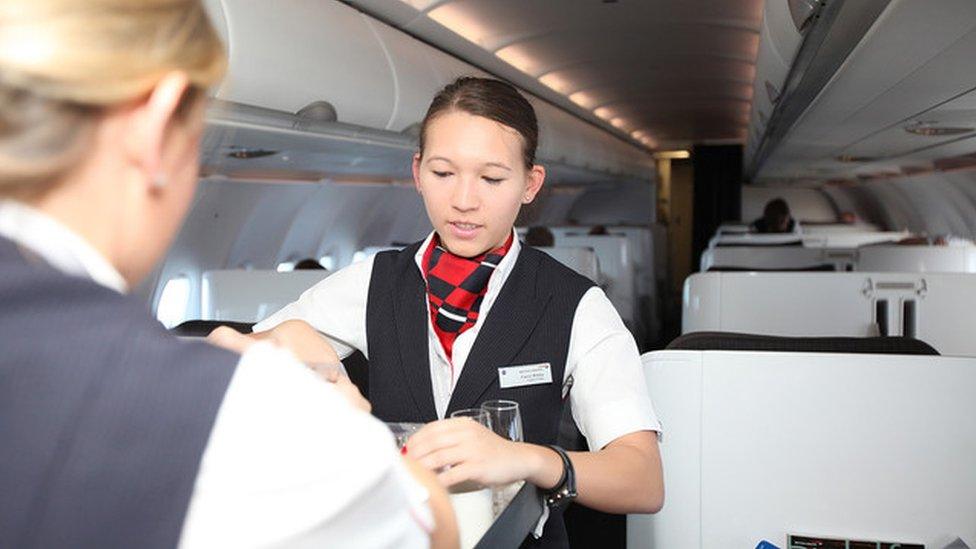Did a 'soap spill' really divert a flight?
- Published

American Airlines flight 729 bound for Philadelphia was diverted to Dublin
Documents seen by the BBC cast doubt on a claim by American Airlines that an "odour" on a flight, which led to two cabin crew falling unconscious, was due to "a spilled cleaning solution".
The incident led to the diversion of a Heathrow to Philadelphia flight, and a passenger being sent to hospital.
Records show part of the aircraft had been leaking oil prior to the flight.
BBC sources say it is likely the leak caused toxic fumes to enter the cabin. However, American Airlines denies that.
'Inconceivable'
One assertion made in an internal American Airlines report on the incident on 21 October does stick out.
It states that "dish soap in a bottle caused two flight attendants to get medical attention and one passenger". Dish soap is the American term for washing-up liquid.
An American Airlines insider, who is not authorised to speak to the media, said it was "inconceivable" that dish soap, or any other cleaning product approved for use on aircraft, could cause two people to pass out.
So far, American Airlines has not responded to the BBC's query on this specific point.
In public statements the company has not used the term "dish soap", instead describing it as a "cleaning solution".
It says the aircraft involved was "thoroughly inspected" after the incident by its "highly-skilled" maintenance team who conduct "an in-depth investigation… whenever a cabin odour event is reported."
American Airlines says: "Cabin odours are a priority for American's leadership team at the highest level of the organisation", and insists the incident was caused by a cleaning agent which spilled mid-flight.
'Overpowering' smell
However, BBC News has seen and heard evidence that casts doubt on that claim.
Firstly, we've been told that a strange "metallic" odour was detected on the same aircraft before the cleaning solution spilled.
The "overpowering" smell was detected on the previous flight, when the plane was travelling in the opposite direction from Philadelphia to Heathrow.
We've also discovered that there was an oil leak on part of the aircraft days before the incident, which could have been the cause.
The part of the plane that was leaking oil is called the Auxiliary Power Unit, or APU.
The APU provides power to start up the engines and to run the electrics on the aircraft when the main engines are not running.
Three days before the aircraft was diverted to Dublin, an engineering maintenance report stated that its APU showed a "high oil consumption".
The leak meant it had guzzled an unusually large amount of oil, 31.75 pints, in the previous two weeks.

Another American Airlines maintenance document stated that the APU was inoperable, and determined that it should be repaired in the coming days.
A "noxious odour" which resulted in "eye and throat irritation" was also recorded on the same plane on 23 October, two days after the flight from Heathrow was diverted to Dublin.
In another report from the same day, the APU on the plane is then described as "wet with oil".
American Airlines claims the odour, which caused two cabin crew to pass out, "was not related to the APU" because the Auxiliary Power Unit was "not operational during this time period and did not operate during this flight."
However, a document written by aircraft manufacturer Airbus clearly states that an APU, which has leaked oil, can contaminate the air supply in the cabin, even when the unit is switched off.
The Airbus document, entitled "APU bleed air oil contamination", states that "oil smell or smoke in the cabin resulting from APU oil contamination can occur at almost any time and not necessarily when the APU is running".
That's because if oil leaks from the APU it can spill into the ducting of the plane's air conditioning system.
Fume events
"If an APU leaks oil then it goes into the ducting", said Captain Tristan Loraine, a former British Airways pilot.
"So these guys have an APU leaking oil. They can fix the APU but they can't fix the contamination of the ducting."
Captain Loraine has spent years raising awareness about so-called "fume events", where oil or other fluids leak and potentially contaminate the air supply in the cabin mid-flight.
The airline industry is generally reluctant to talk about the problem, and it is by no means an issue which is specific to American Airlines.
The two cabin crew members who passed out on the flight from Heathrow are not authorised to speak to the BBC.
However, we understand that nearly a month on from the incident, one of them is experiencing heavy migraines. Previously that person did not experience regular headaches.
American Airlines said: "It cannot be emphasised enough that the health and welfare of our crews and customers continues to be our top priority.
"However, in the case of this aircraft and the diversion to Dublin, there is no connection to the APU or bleed air from the APU."
- Published21 October 2019

- Published17 October 2019

- Published28 March 2019
